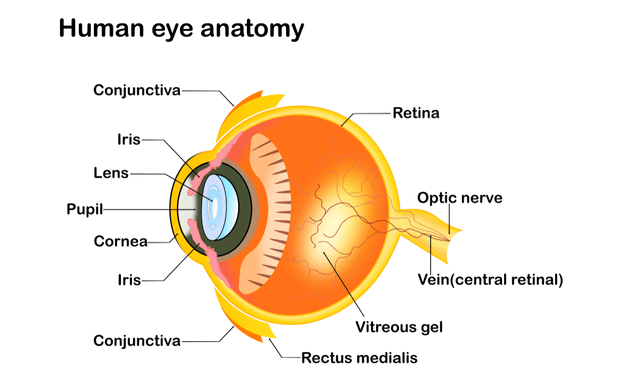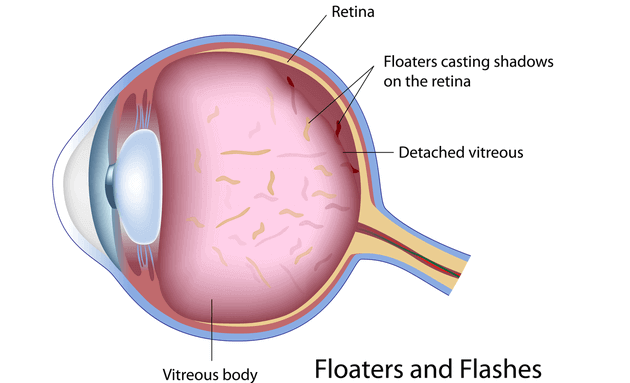What are Eye Floaters and How Can it Affect Your Vision
Though they look like objects in your environment, eye floaters or eye flashes are actually inside your eyes. They are lines, spots, or weblike lines that move across your visual field. They generally appear as black or grey smudges that drift as you move your eyes around, almost like they’re following your gaze.
The only difference between eye flashes and eye floaters is that flashes are usually experienced at night or in dark spaces, whereas floaters are generally seen during the day time.
What Causes Eye Floaters and Eye Flashes?

A gel-like substance called vitreous fills about 80% of your eyes. When the vitreous gel shrinks and loses its round shape, it becomes stringy and casts tiny shadows on the retina. These shadows are called eye floaters. They eventually settle below the line of your sight but can cause minor disruptions initially.
As in the case of eye flashes, the light entering your eye stimulates the retina which in turn produces an electrical impulse which is transmitted to the brain. The brain interprets this as light or some form of an image. This is called photopsia or eye flashes and may be short-lived or continuous, depending on the extent of damage to the retina.
However, if either persists or becomes painful, chances are that it has stemmed from a much more serious cause like an infection, haemorrhaging, eye injury, or retinal tear. It is advised to consult an ophthalmologist in that case.
Who Is at Risk of Experiencing Eye Floaters and Eye Flashes?
Factors that put you at risk of eye floaters are:
- Being above the age of 50
- Nearsightedness
- Eye trauma
- Diabetic retinopathy
- Inflammation of the eye
- Complications from cataract surgery
What Are the Symptoms of Eye Floaters and Eye Flashes?

The symptoms of eye floaters and eye flashes are:
- Small, weblike shapes in your vision that appear as dark smudges or transparent floating strings
- Spots that seem to follow your line of sight, so when you try to look at them, they move quickly out of your field of vision
- Spots that are most noticeable when you look at a plain bright background, such as a blue sky or a white wall
- Small shapes or strings that eventually settle down and drift out of the line of vision
When Should Eye Floaters/Flashes Be a Concern?
Eye floaters or flashes can sometimes point to a more serious eye condition that can result in vision loss. The shrinking vitreous can pull at the retina, causing it to detach or tear from the tissues that sustain it. It is called retinal tear or retinal detachment and is usually painless but may eventually lead to permanent loss of vision.
Concerning signs are:
- A new set of floaters or flashes in the eye
- Gradual shadowing of vision (like someone pulling the curtains)
- Sudden decline in sharp vision due to macular degeneration (macula is the area of the retina responsible for sharp vision)
If you experience any of the above symptoms, you should consult an ophthalmologist immediately.
How Can You Get Rid of Eye Floaters?
Floaters or flashes generally don’t require any intervention. But if they are too dense that they end up affecting your vision on a day-to-day basis, your eye surgeon may suggest a surgical procedure called vitrectomy.
Vitrectomy removes the vitreous gel in your eye, along with all the floating particles, and replaces it with a salt solution. This will not affect you as most of the vitreous is only liquid and will not exhibit any difference to your eyes.
Another way to get rid of eye floaters is laser therapy that involves breaking up the floaters in your eye by aiming a laser at them. However, this method is still in its experimental stage and may not be advised by your eye surgeon. It can lead to retina damage if not performed correctly. Consult your doctor before opting for any such procedure.
How Can You Take Care of Your Eye Health?

Following a general eye care routine can help evade multiple avoidable eye-related illnesses.
- Get a comprehensive eye checkup done routinely
- Maintain a healthy diet with plenty of fruits, vegetables, and proteins
- Keep yourself hydrated
- Wear protective glasses when stepping out in the sun
- Give your eyes rest and avoid digital viewing as much as possible
Basic eye care routines can help keep your eyes healthy. However, if you experience any symptoms, consult an ophthalmologist at the earliest.






